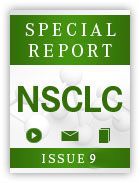Dr. Roman Perez-Soler on Treating NSCLC After First-Line Treatments
Roman Perez-Soler, MD, talks about NSCLC tumors becoming resistance to chemotherapy and first-line treatment.
Roman Perez-Soler, MD, chairman and chief, department of medical oncology, Montefiore Medical Center, deputy director, Albert Einstein Cancer Center, talks about non-small cell lung cancer (NSCLC) tumors becoming resistant to chemotherapy and first-line treatment.
Perez-Soler says that usually NSCLC tumors become resistant within 2 to 3 months, or grow back with a resistance to the same drug initially used as treatment. He adds that once that occurs, it could be time to switch to immunotherapies, which he believes could also be an effective front-line treatment by themselves or with chemotherapies due to their low toxicities.

Survivorship Care Promotes Evidence-Based Approaches for Quality of Life and Beyond
March 21st 2025Frank J. Penedo, PhD, explains the challenges of survivorship care for patients with cancer and how he implements programs to support patients’ emotional, physical, and practical needs.
Read More